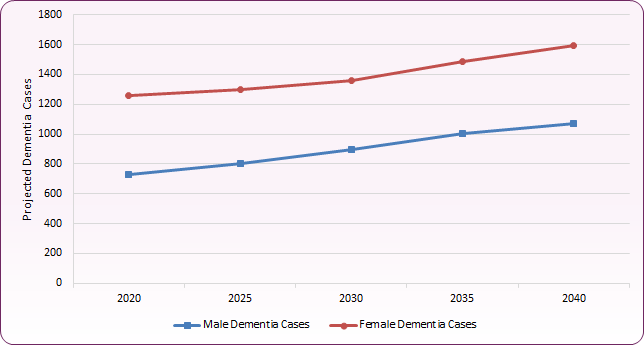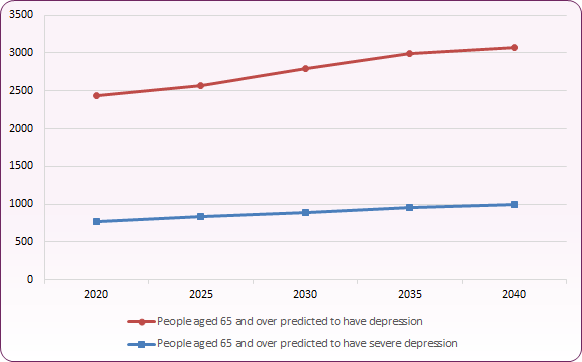Mental Health in Older People
Last Modified 09/12/2025 13:26:49
Share this page
Introduction
Social isolation and loneliness are recognised risk factors for poor mental health and are experienced by over one million older people in the UK.1,2 Based on current population projections, the number of people aged 50 and over in England who often feel lonely will reach 2 million by 2025/26.3 Strengthening positive relationships and promoting opportunities for participation in meaningful activities in later life will help to promote mental health and wellbeing for all of us. Factors that contribute to loneliness, social isolation and increased risk of mental health problems in older adults include:3,4
-
- Living alone
- Poor physical health
- Being widowed or experiencing other bereavement
- Having family circumstances that prevent them doing things they want to (mobility, caring roles, digital exclusion etc.)
- Having financial concerns / poverty
- Not having someone to open up to when they need to talk
- Discrimination
Amongst the over 65s the two most common mental health problems are depression and dementia. Loneliness has been associated with an increased risk of dementia; and loneliness, social isolation and living alone have also been associated with premature death.2
The COVID-19 pandemic has exacerbated social isolation, loneliness and mental health concerns among older people. A 2021 Age UK study found that:
-
- Pre-existing mental health conditions had worsened
- Anxiety levels, low mood, low confidence, and depression had increased
- More people had become withdrawn and isolated
- Coping strategies have been limited
- Some older people's self-care had deteriorated
- Some older people had adopted unhealthy coping strategies (excess eating, smoking, alcohol use)
- Some older people's cognitive ability has declined as a result of reduced social contact
- Those with dementia had been severely impacted, with rapid cognitive decline
Dementia
In the UK there are an estimated 982,000 people with dementia and this will increase to over one million by 2030 and by 2040 this figure is expected to rise to 1.4 million. It is estimated that 1 in 14 adults over 65 have dementia, and of these, 65% are female. As we have an expanding ageing population and prevalence increases significantly with age, more challenges and pressures will be placed on health and social care.6
The needs of people with dementia and their carers already require high levels of health and social care input and this requirement will increase to meet the projected needs of this rapidly growing group. Family carers of people with dementia are often older and frail themselves with high levels of depression and physical illness and a diminished quality of life. Hence, dementia is seen as an NHS priority area, and in 2009 a National Dementia Strategy was launched. This was followed by the coalition government's 'Prime Minister's Challenge on Dementia' and in 2015 a further 'Challenge on Dementia 2020' was published aimed at improving dementia care, support and research by 2020. In 2022 the then Conservative government announced a 10-year strategy for dementia, which was then scrapped to be included in the Major Conditions Strategy (2023).7
Dementia is the single most frequent cause of admission to care homes, and of the need for community care services for older people. The demographics of an ageing population indicate the number of people with dementia (aged 65 and over) in Blackpool is predicted to rise to around 2,660 by 2040 (figure 1).
Figure 1 - Blackpool: males and females aged 65+ expected to have dementia (projected to 2040)
 Source: POPPI, 2020
Source: POPPI, 2020
Depression
In the UK depression affects around 1 in 5 older people living in the community and 2 in 5 living in care homes. However, fewer than one in six older people with depression ever discuss this with their GP.8 As the population ages within Blackpool, the number of people affected by depression is expected to increase (figure 2).
Figure 2 - Blackpool: expected numbers of people 65+ with depression/severe depression (projected to 2040)
 Source: POPPI, 2020
Source: POPPI, 2020
[] Age UK (2015) Evidence Review: Loneliness in Later Life.
[] Age UK (2019) Later Life in the United Kingdom 2019.
[] Age UK (2018) All the Lonely People: Loneliness in Later Life.
[] Mental Health Foundation (2016) Fundamental Facts about Mental Health 2016
[] Age UK (2021) Impact of Covid-19 on older people's mental and physical health: one year on.
[] Alzheimer's Society (2024). The Economic Cost of Dementia, CF/Pathway Touchpoint.
[] Department of Health & Social Care (2023). Major conditions strategy: case for change and our strategic framework.
[] Age UK (2016) Hidden in Plain Sight: The unmet mental health needs of older people.